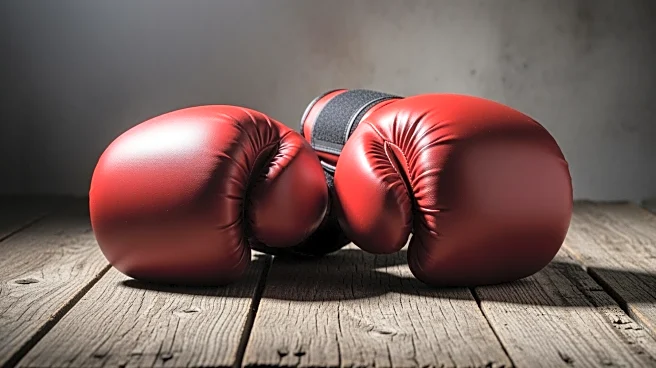What's Happening?
Ishmael Davis, a British light-middleweight boxer, is preparing for a significant match against Sam Gilley for the British and Commonwealth titles. Scheduled for November 15 at Tottenham Hotspur Stadium,
this fight is crucial for Davis, who has faced three losses in his last four matches. Davis's journey to this point has been marked by personal challenges, including being expelled from school and becoming a father at 14. He turned to boxing at age 12, but his dreams were initially sidelined as he struggled to support his family. Davis's life took a difficult turn as he became involved in gangs and drug dealing, leading to imprisonment. Now, at 30, Davis is using his experiences to motivate others, particularly young people who might be facing similar challenges.
Why It's Important?
Davis's story is significant as it highlights the transformative power of sports and personal determination. By sharing his experiences, Davis aims to serve as a role model for youth who may be at risk of falling into crime or gang involvement. His journey underscores the potential for redemption and change, offering hope to those in similar situations. The upcoming fight not only represents a chance for Davis to reclaim his career but also to amplify his message of resilience and positive change. His efforts to engage with young people and steer them away from crime could have a lasting impact on communities struggling with gang violence and drug-related issues.
What's Next?
As Davis prepares for his upcoming fight, he is focused on using his platform to inspire and support young people. If successful in his match against Sam Gilley, Davis could gain further visibility, enhancing his ability to reach and influence more individuals. His commitment to giving back to the community suggests ongoing involvement in mentorship and outreach programs. The boxing community and fans will be watching closely to see if Davis can overcome his recent setbacks and emerge victorious, potentially opening doors for further opportunities both in and out of the ring.
Beyond the Headlines
Davis's story raises broader questions about the role of sports in social change and rehabilitation. His experiences highlight the challenges faced by young people in disadvantaged communities and the importance of providing positive outlets and support systems. The ethical implications of his past actions and his current efforts to make amends offer a complex narrative of personal growth and societal impact. As Davis continues to share his story, it may prompt discussions on how sports organizations and community leaders can collaborate to address issues of crime and poverty.










